

This being the final issue of Biologue for the year, we want to thank all of you for the various contributions you have made over the past ten months. We've had some great articles, news from your labs, activity reports, poetry (our resident poets have been a little less active this year than in the past, but perhaps the Muse has not touched them at just the right moment -- maybe the summer will bring more inspiration), and of course our great wealth of cartoons. On the latter score we especially want to thank Gerry Rhode and Carolyn Craig, who have been faithful suppliers of humor. We appreciate their attentiveness on these critical matters! So, again, thanks to everyone who has contributed, as it is your efforts that make Biologue possible.
Shifting gears, we have a great issue for you, replete with the usual "Comings and Goings" section, varieties of departmental news -- from a report about Roy Curtiss' new vaccine patent to Barbara Schaal's election to the National Academy -- more cartoon s and several miscellaneous announcements. All are sure to make your day and bring the year to a close with a sense of much accomplishment.
So, as you sit back and browse through the pages of Biologue, be thinking about the activities you and members of your lab group have coming up this summer, and be prepared to give us a short report in the fall. We know from the grapevine that many peop le have interesting trips, both professional and pleasure, coming up this summer, and urge you to jot them down for the September issue. Meanwhile, from all of us, HAVE A GREAT SUMMER and we'll see you in August.
The Editors
Gar Allen
Tuan-Hua David Ho
Eric Richards>
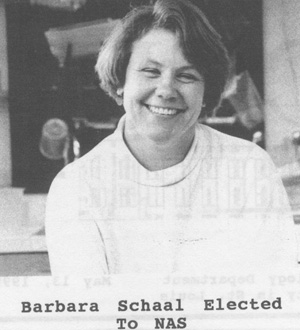
Todd Jackman has been offered assistant professorships at California State at Northbridge, Villanova University and Eastern Illinois University. Todd has elected to go to Villanova, starting this summer. Congratulations to Todd -- it's great to have such choices.
Doug Creer and Manual Leal both received NSF Dissertation Improvement Grants, each for approximately $10,000.
John and Michelle Parks are expecting a child in December, so we'll keep you posted in our Christmas issue! Congratulations
Ian Cornelius an undergrad researcher in the lab, received a Howard Hughes Summer Fellowship.
In recent travels, Jim Schulte returned in March from six weeks in Argentina and Chile and Rich Glor from four weeks in the Dominican Republic. Jane Melville leaves for six weeks in the Mojave Desert later this month. Jonathan, Man uel, and Rich are hoping to go to Cuba in mid-May, but permits are still pending with the Cuban government.
On the alumni front, Duncan Irschick recently had a job interview at UC-Riverside and has one next month at the University of Glasgow. Marguerite Butler, currently at the Institute of Mathematical Sciences in Tokyo, will begin a postdoc at the University of Oregon later this year.
It sounds like things are buzzing along with the Losos Lab - keep it up!
-- Eds
Congratulations on the distinction, Kathy -- and No! you don't need grey hair.
-- Eds
The method developed by Roy and his co-workers involves first eliminating the danger of the bacteria becoming infectious by knocking out the portions of its genome responsible for virulence, and then splicing in genes for a variety of bacterial antigens. The antigens would then trigger the immune response to organisms in the body had never seen. A principal target of this research is Salmonella responsible for millions of food-poisoning incidents in the U.S. alone every year. In addition, Roy hopes t he techniques can be applied to Heliobacteria pylori (the causative agent of ulcers), Campylobacter jejuni (human and poultry diarrhea), the bacterium responsible for TB, the Hepatitis B bacterium and the parasite that causes malaria. We all wish Roy wel l as this work proceeds.
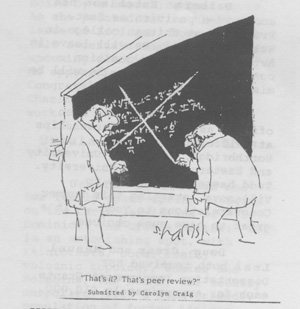
Dion Dickman and Phoebe Lin were recipients of the Spector Prize, and John Bernat, Jr, was the winner of the Stalker Award. John (Mac) Barston received the Moog Scholarship.
The Spector Prize is named for Marion S. Spector, an alumna from the class of 1938 who worked with Viktor Hamburger, Edward Malinckrodt Distinguished Professor of Biology, emeritus. The Stalker Award is given in honor of Harrison D. Stalker, Professor of Biology in the Department from 1941 through 1981, to a graduating senior distinguished for both academic excellence in science and for breadth of interest. The Moog Scholarship was established in memory of Professor Florence Moog, a member of the department from the mid-1940s through the early 1980s, and is annually awarded to a second-semester sop homore. The three graduating seniors will be recognized at a ceremony in Holmes Lounge on Wednesday, May 12 at 3:30.
The two Spector winners presented seminars on their work on April 26. Dion Dickman spoke about "Characterization of Neuronal Adhesion to Agrin by an Integrin-Mediated Mechanism," while Phoebe Lin talked about her work on "Ajuba, a Grb2-associating Novel LIM Protein which Enhances MAP Kinase Activity in Fibroblasts, Promotes Meiotic Maturation of Xenopus Oocytes in Grb2 and Ras dependent Manner". A reception followed for the students and the lab mentors and associates and all faculty in Rebstock 309. Both will be pursuing exciting careers in the biomedical sciences next year. Dion Dickman will be going to Harvard's PhD program in the Division of Medical Sciences, while Phoebe Lin will enroll in the MD/PhD program at the University of Illinois in Chicago.
John Bernat is completing a major in Biology with a concentration in Biochemistry, as well as a minor in Physics, and another minor in Music in the college of Arts and Sciences. He has worked in Sally Elgin's lab for almost four years, having beg un as a Prefreshman in the WU/HHMI program. In addition to his commendable academic performance and his independent research work, Bernat is an accomplished musician -- both piano and organ -- who shortly after coming to the University became pianist, an d in March '98, Music Director for the Washington University Catholic Student Center. He will graduate summa cum laude this May and plans to pursue an MD/PhD degree.
John (Mac) Barston is a double major in Archeology and Classics. He is also fulfilling a minor in Biology with an emphasis in Botany. In addition, he is a student of both Latin and Greek. According to Mac, the two areas of scientific research t hat fascinate him are ethnobotany and paleoethnobotany. He has been involved in an ethnobotanical research project at the University of Pennsylvania for three years and this summer will have the opportunity to accompany his mentor to Kenya and to partici pate in an ecological plant survey of the habitat in which the research has been conducted. While unclear about his career goals, he envisions himself in graduate school after which he'll concentrate on research and teaching. Mac has also received recogn ition for his writing, winning the Julius Nyere Essay Prize from the department of African and Afro-American Studies for a paper entitled "Energy inefficiency as a Cultural Adaptation: Risk-Minimization Among East African Pastoralists". Last year, he wa s also the recipient of the Phi Beta Kappa Freshman Book Award.

"Some biologists at Washington University here have helped a declining local frog population to bounce back.
A team headed by Owen J. Sexton, an emeritus professor of biology, has reintroduced wood frogs to the area, where they hadn't been seen since 1911. The wood frog is common throughout northern and eastern North America.
Sexton's work is described in Status and Conservation of Midwestern Amphibians, a book published last year by the University of Iowa Press. In 1980, Sexton, with a state conservationist, retrieved a mass of wood-frog eggs from a remote lake 60 miles out side the city. He placed the eggs in an artificial pond at a university-owned reserve (Tyson) and let nature take its course. In 1987, he counted 311 frogs. By 1995, where were 364, and the number is still growing.
Some of the wood frogs have crossed a six-lane highway (I-44) to move to another pond. Mr. Sexton said he had expected them to move beyond their "birth pond," but couldn't explain what would have led them to that one."
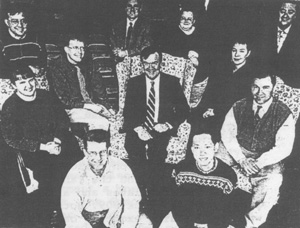
Good news to share: two of our first year Plant Biology students, Katherine Mason and Leeann Chandler have won NSG graduate fellowships! I'm told that only three NSF scholarships were awarded this year to students in the Division of Biology and Biomedical Sciences here at Wash U. Congratulations, Katherine and Leeann! (To which we add our voices as well -- Eds)
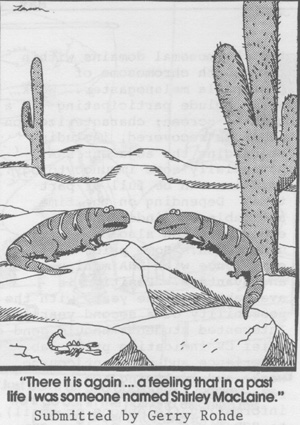
The lecture was followed by a lively discussion with Dr. Endler, replete with gourmet pizzas.
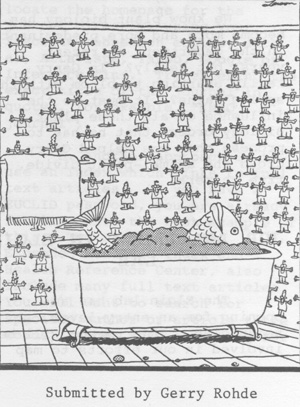
"Structure, function and expression of aquaporins in flowering plants" by Dr. Maarten Chrispeels, Dept. of Biology, University of California at San Diego, La Jolla, CA, McDonnell Hall 162, 4:00 PM Friday, May 14, 1999.
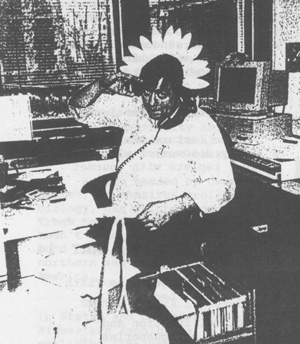
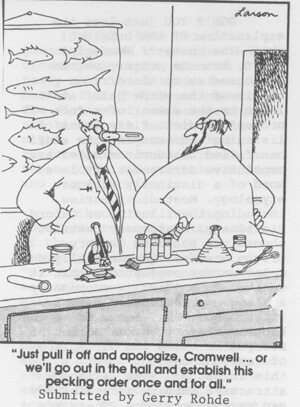
Regardless of the media hype on the demise of books, there are still many limits to depending on electronic access. Sometimes it's very slow or too expensive or just not available yet. Many older volumes will probably never be digitized. At least for t he near future, you will continue to visit the libraries on campus and use traditional interlibrary loan and photocopy services. But many titles are available electronically on campus (with a paid library subscription and/or registration), so now is an e xcellent time to discover and begin to use them. Eventually we may lose some access because we will choose paper-only or web-only in order to save funds. Some publishers may decide to make some or all articles available web-only; this is true already fo r some supplementary data and articles requiring special graphics, etc.
So what is the easiest way to find out if a particular citation is available this way? One day we hope information about online journals will be easier to find. Meanwhile, this is Ruth Lewis' recommendation:
1. First, consider your citation. If the article you need was written before 1996, there is little chance it will be available online. There is one major exception, the JSTOR project, which is digitizing complete runs of selected journals and includes several ecology titles, such as, Ecology, Ecological Applications, Ecological Monographs and Annual Review of Ecology and Systematics. JSTOR may distribute a group of botany titles soon. JSTOR titles can be found in the library Catalog.
2. If you need a fairly current article, search the journal title in the Becker Medical Library catalog, an extensive, up-to-date resource which is easy to use. Go to the Catalog page at http://catalog,wustl.edu and click on "medical Library Cat alog - ECAT".
3. If the title isn't listed or no electronic access is listed in ECAT, try the biology Library Ejournals page at http://library.wustl.edu/Subjects/Life/ejournals.html
4. If 1-2 haven't worked, its' not very likely that the journal is available on the web at WU, but you could still try to locate the homepage for the journal directly, using your favorite websearch engine, such as, AltaVista, Yahoo, Google or Inference f ind. Try entering the exact title of the journal in quotes, for example, "EMBO journal".
5. Another approach is to use an index which links to full text articles. If you have a EUCLID password, you are already familiar with the best example of this. Two other indexes, Expanded Academic Index and Health Reference Center, also include many f ull text articles. You will want to search for specific author or article title words, rather than searching for Journal Title, as in option 1-3. The major indexes in biology are all listed in WorldWindow [http://library.wustl.edu] in the "Journal Index es" menu and several other places.
Biology Library staff will be happy to help you with this if you have further questions or comments.
MOST etymologists agree that the "bucket" refers to a kind of yoke that was used to hold pigs by their heels so that they could be slaughtered, and was particularly used in parts of Norfolk. The subsequent death-throe spasms of the unfortunate anima ls created the impression that they were "kicking the bucket". The derivation is either from Old French bouquet (a balance) or the fact that the raising of the yoke on a pulley resembled a bucket being lifted from a well. The term is known to date from at least the 16th century. The more interesting (and probably apochryphal) origin relates to suicides who would stand on a large bucket with noose around the neck and, at the moment of their choosing, would kick away the bucket.
MANY modern American English words - most notably "jazz" and "OK" - owe their origins to African languages, dialects and word formations. Originally popularised by black-face minstrels, "Kick the bucket" comes, via kickeraboo (dead), from the West A frican Ga words kekre, (stiff) and bo (to end up), and also the Sierra Leone Creole Krio kekerabu (dead).
DON'T YOU just love the explanation of the origin of "kick the bucket"? Wonderful stuff, but the writer must be disabused as to the African origin of the word "jazz" at least to the extent of a "not proven" verdict. Fifty years of listening and studying the stuff has failed to convince me of any conclusive derivation. It is a word of a distinctly dubious etymology. Most dictionaries, including the illustrious Oxford Dictionary, cautiously restrict th emselves to "20th Century. Origin obscure". Occasionally one comes across suggestions that it derives from "jass" - supposedly a slang expression for sexual intercourse. That seems to me to hang in there with the notion of Storyville being the birthplace of jazz. Since this is not so "jass" although attractive suffers a credibility gap as a consequence. There are very many other theories ranging from the doubtful to the hilarious. The French verb "jaser" - to chatter - has been in the witness box. Verdict: also not prov en. Someone came up with the hypothesis of a derivation from "chasse beau" alleged to be a Louisiana dance figure. And there was me thinking that chasse beau was a disease of sheep! My out and out favorite is that jazz is a corruption of the Cajun slang e xpression for a prostitute: "Jezabel" - pronounced as "jasse-belle". And the band played "Believe it if you like!" Since jazz was not a word often employed by early New Orleans musicians themselves (as an examination of the many hundreds of musicians card in the New Orleans Jazz Museum reveals: very, very few mention jazz at all. The vast majority refer to "music for all occasions") such fruitless speculations need detain us no longer. No doubt Tony will enlighten us.
IN THE 1920s Chicago gangsters used to punish "double crossers" by tying them to a heavy chair with their feet in a bucket filled with wet cement. The victims of course struggled and kicked the bucket. By the night, when the cement had hardened, the double crosser was taken for a ride to Lake Michigan and dumped in.
The writer is also incorrect concerning the origin of the "word" OK. This is actually a acronym taken from "Old Kinderhook," a nickname of an early American President, Martin Van Buren.
As an academic I frequently become disturbed when I hear sports commentators referring to events which have little or no effect on a match result as academic. Am I being oversenstive or should I just give up teaching?
I PRODUCED an academic diary to help fix the date of a meeting which was to be in the next calendar year, only to be asked if the dates bore any relation to reality.
PUTTING ASIDE the obvious question of why anyone would concern himself with sports commentators' piffle, their assumedly derogatory reference to something being "academic", must be analysed in the context of the OED definition of that word: "not of practical relevance". Withal, one must consider the subject an academic teaches and its "practical relevance". A truly good teacher can create such relevance for almost any subject, whereas a poor one could deprive even a course in carpentry of it. Thus, you must look inwardly to determine whether or not, in your case, the sportsters' label is pejorative.
POLITICIANS wishing to rubbish opponents' ideas without going to the trouble of a proper argument often airily dismiss them as "theology". The consequent implication that theologians specialise in peddling unexamined a priori statements should have Aquinas, Duns Scotus, William of Occam and the rest gyrating in their graves.
I FEEL much the same about the term "paper qualification", which is often used to devalue hard-earned qualifications. It implies that "the school of life" is all one needs to undertake some of society's most difficult tasks.
THE QUESTION is academic.

WEATHER forecasters took this one to their hearts a while ago, frequently describing temperature predictions as academic, i.e. "of academic interest only". This is because the wind-chill factor often makes the effective temperature in the open rather low er than that in a sheltered spot in the same vicinity. If you find this usage so disturbing, I can't imagine how you cope with the ravages of teaching.
Iz ther a sosaieti that beleevz thee Inglish langwidge shud bee spelt az it iz spoeken?
IF THEE letus mi childrun bring hom frum thee lokul comprihensiv skool ar enithing tu go bi, ther iz indeed sutch a sosaieti - it iz corld thee Nashunl Yoonyun ov Teechus.
THE answer is yes: there have been such societies since the 19th century. The main one today, based in the UK, but with links around the world, is the Simplified Spelling Society. While the SSS believes all alphabetic scripts are best designed so th at pronunciation determines spelling, and spelling reflects pronunciation, this ideal cannot easily be applied to modern English. For one thing, English has no standard pronunciation on which to base such a spelling system; and for another, the changes re quired would be so radical as to produce an upheaval in world communication. However, many small improvements to English spelling could be easily introduced. We could get rid of 'gh'. We could write delt, hed, helth, mesure, etc. We could align the ending s of burglar, teacher, doctor, neighbour, murmur, martyr, or of assistant, consistent, etc. We could tidy up such anomalies as speak/speech, high/height. We could all write 'acomodation' and 'comitee' - as many people already do. We could cut out innumerable redundant letters, making all writing faster. The Simplified Spelling Society would like to hear from all those interested in pursuing the question.
ILLOGICALITY is one of the few good attributes of the English and should not be tampered with.
THE PROBLEM would be, spoken by whom? In different parts of England I have heard the word 'come' pronounced variously as kum, koom, kim and kahm.
I BILEEVD in funetik speling until Ie bot dhu Sho Alfubet Eedishun uv Andruklaes und dhu Lieun. Whie wer dhaer difurunt voulz in kat und fadhur, in good und food? Hou kood Ie get foer spelings for to, tor, toer, und toor? Dhu problum iz dhut eedhur speling must vaeri from reejun to reejun, from klas to klas, or wee ol have tu aksept dhee arbitruri speling uv wun groop. Gleskurantu rrolz OK?
THE following quotation might offer a possible solution: A Plan for the Improvement of English Spelling by Mark Twain. For example, in Year 1 that useless letter 'c' would be dropped to be replased either by 'k' or 's', and likewise 'x' would no lon ger be part of the alphabet. The only kase in which 'c' would be retained would be the 'ch' formation, which will be dealt with later. Year 2 might reform 'w' spelling, so that 'which' and 'one' would take the same konsonant, wile Year 3 might well abolis h 'y' replasing it with 'i' and Iear 4 might fiks the'g/j' anomali wonse and for all. Jenerally, then, the improvement would kontinue iear bai iear with Iear 5 doing awai with useless double konsonants, and Iears 6-12 or so modifaiing vowlz and the rimeining voist and unvoist konsonants. Bai Iear 15 or sou, it wud fainali bi posibl tu meik ius ov thi ridandant letez 'c', 'y' and 'x' - bai now jast a memori in the maindz ov ould doderez - tu riplais 'ch', 'sh', and 'th' rispektivli. Fainali, xen, aafte sam 20 iers ov orxogrefkl riform, wi wud hev a lojikl, kohirnt speling in ius xrewawt xe Ingliy-spiking werld.
